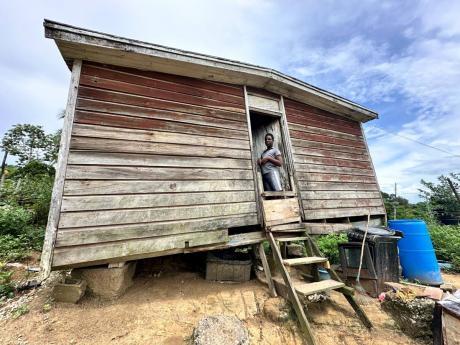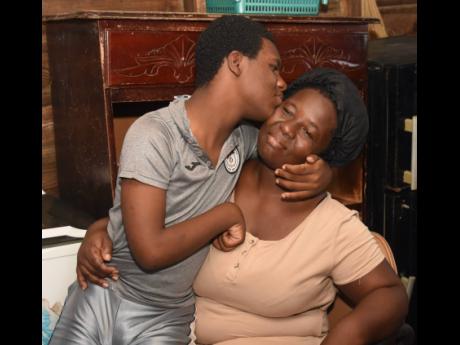10 years out of school
Single mother’s decadelong struggle to enrol 14-y-o in special education continues
After 10 years of emotional and financial strain, single mother Janice Jenkins is still desperately trying to enrol her 14-year-old son, Antwone Stewart, who has been diagnosed with an intellectual disability, into a special education institution.
The Somerton, St James resident, who has been unemployed for a decade, spoke with The Sunday Gleaner last week about the struggles of not having Antwone enrolled in school.
Despite her efforts to keep Antwone still, he grabbed, kissed, and hugged her as he played during the interview.
“I feel sad, I feel hurt,” Jenkins said as she tried to keep her emotions in check. “I can remember his peers going to school and every September morning, I would just cry because he cannot go. Now I am getting over it, but there are times I would feel like he is rejected because of how some people treated him and I feel hurt about that.”
Antwone's problems started at birth, she recalled, noting that he had to stay in the nursery for two weeks.
From a young age, he experienced frequent hospitalisations. At just seven months old, he had his first seizure and subsequently suffered a stroke. Now, he is unable to care for himself, has a speech impediment, and endures both panic and anxiety attacks.
At age four, Antwone was enrolled at the Somerton-All Age and Infant School. However, he fell ill again shortly after, and has not attended school since.
“The medication he got gave him side effects which caused his eyelashes to fall off and [he began to] act crazy. The doctor prescribed another medication, bile acid, and she said I should give him both of them ... When I started giving him the bile acid, he had episodes of seizures, which caused his brain and liver to swell. His speech was taken away from him and everything rolled right back. He could not walk, sit up, or roll over. He spent a month in the hospital because of that, and from there he is like that,” Jenkins recalled.
Jenkins and her two children live in a zinc-roofed rented one-bedroom wooden shack that appears to be falling apart in the Yorkland area of Somerton. Inside, it contains a bed for Jenkins and her children, along with a gas stove and a refrigerator.
Perched on the hillside, the yard has a makeshift gate to keep Antwone from wandering off.
The mother told The Sunday Gleaner that poverty has hindered her efforts to help Antwone acquire some basic skills.
Prior to his illness, he had toilet training up to four years old. However, he lost all the abilities that typically developing children acquire, making it challenging for him to be accepted into a special education school.
incomplete potty training
Two schools have refused to accept him due to his incomplete potty training, and the one school that is willing to admit him has a tuition fee of $85,000 per term, which she cannot afford.
“I try to potty train him, but I don't have a bathroom. I have to use next door,” Jenkins said with a heavy sigh. “He has to wear diapers because he can't tell me when he wants to go. The last time I shared this with somebody at the school, it was like a big discrimination. I really felt bad, but the fact is I just don't have [a toilet]. Maybe if I had one, it would have been easier for me to potty train him. ... It is really hard because of his condition,” she added.
The challenges kept mounting, Jenkins said, as her cousin, who would assist in taking care of Antwone, passed away.
Frustrated, the mother believes that obtaining assistance for her son to see a speech therapist would make things significantly easier for him.
“The Government doesn't really do much for the persons with disabilities. I don't know what the reason is, maybe they are not getting enough funds concerning persons with disabilities. We are not getting much help from them. They let me know it is just a shadow programme they do so they cannot really help after the [education] ministry told me to do an assessment,” Jenkins said.
Shadows provide one-on-one support in classrooms to hundreds of special needs students across Jamaica, assisting them with their personal care and safety and in developing their independence as well as their academic, social and behavioural skills. However, there is a well-documented shortage of shadows across the island.
“I contacted people in Montego Bay, and they said if I got a speech therapist, they would have helped. They keep saying go ahead and look if you can find a school, but when I found one, they can only grant me $30,000 and there is not much more that they can do,” she added.
The Ministry of Education and Youth has not responded to The Sunday Gleaner's request for details of the provision it makes for students with special needs.
several levels of
intellectual disability
Dr Carleene Grant-Davis, the senior medical officer for the Western Child and Adolescent Hospital in St James, told The Sunday Gleaner there are several levels of intellectual disability, ranging from mild to severe.
“Severe people have an average mental age between three and six years. They use single words, phrases or gestures to communicate. Profound people have an average mental age of three years and below. They usually communicate non-verbally,” Grant-Davis explained.
“Moderate people have an average mental age of six to nine years. They can communicate using simple language. They achieve an education of about an elementary school level,” she continued. “Mild people have an average mental age of between nine and 12. Their disability may interfere with learning or complex tasks. However, they can often work around these issues, especially with specialised interventions. They also often work and live independently.”
The causes, she said, are many and varied. And in some cases, a cause cannot be pinpointed as they may occur at the prenatal stage, during pregnancy, at the time of birth, or after birth.
“For the prenatal period, it may be chromosomal abnormalities (e.g. Down's syndrome), while during the pregnancy, it may be infections such as HIV, rubella, or Zika virus. During birth, it includes extreme prematurity, and after birth, it includes severe head injury,” said Grant-Davis.
Additionally, there is no cure or specific treatment for intellectual disability. In fact, treatments focus on helping with adaptive behaviours and life skills. A child with intellectual disability is best cared for by a multidisciplinary team, including speech pathologists, audiologists, neurologists or developmental pediatricians, nutritionists, and teachers.
“These specialists develop a comprehensive, individualised programme for the child that should begin as soon as the diagnosis of intellectual disability is suspected. The parents and siblings of the child also need emotional support and sometimes counselling. People with intellectual disability and coexisting mental health disorders such as depression may be given appropriate medications,” Grant-Davis said.
“However, giving a child medication without doing behavioural therapy and making environmental changes is usually not helpful. All children with intellectual disability benefit from special education,” she added.
If you want to help Janice Jenkins and her son, Antwone, you can contact them at 876-778-9814 or 876-312-3531.


